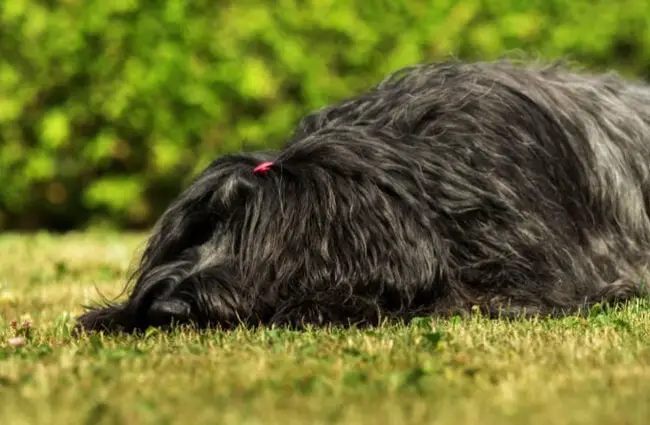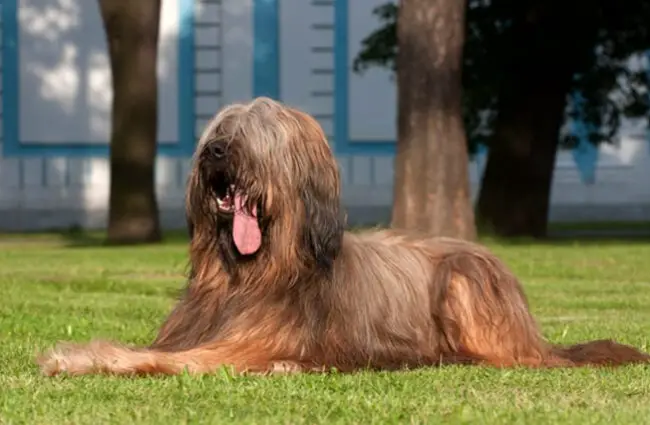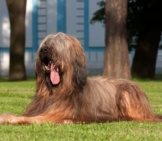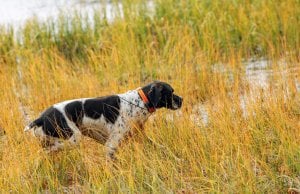The Briard is known for its loyalty and love of family. They are a true guardian of their flock, whether that is sheep or you! Loving without being overly dependent these dogs make great pets for both city and country dwellers, as long as they get enough exercise.
It comes as no surprise that these warm and affectionate dogs are often called a “heart wrapped in fur.” Their long, shaggy fur surrounds a courageous, devoted, and fun dog. Read on to learn more about the Briard.
Description of the Briard
Instantly recognizable by their signature “peek-a-boo” hairdo and long fur, the Briard is a beautiful dog with a strong and graceful air.
Bred in France to be both excellent herders and fearless flock guardians, these dogs still love to watch over and protect their families. Under their thickly furred exterior the Briard is a strongly-built dog that is able to work long days, but is still agile and nimble. They are athletic and large, but well built and always up for a challenge.
This breed was a favorite among French farmers for years, and became the official war dog of the French Army during World War I. Needless to say news of the intelligence, loyalty, and loving nature of this breed got out and they spread around the world.
The Briard has a coat of majestic proportions. The outer coat is thick and coarse, and is six inches long at the shoulders! This beautiful fur is also lush around their faces, and gives them their famous centrally parted hairdo and arching eyebrows, which hang over their eyes.
Under those bushy eyebrows, however, are frank and inquisitive eyes that are ever alert. Coming in shades of black, gray, and tawny, the Briard is as warm and earthy colored as the region of France from which they come.
Life Expectancy and Size
While often a quite robust breed, the Briard is not immune to health issues that can affect their lifespan. But on average these dogs go on to live full and happy lives of about 12 years. Working with a reputable breeder who screens for health problems can help prepare you for future issues.
Rugged and bred for physically demanding work, this breed has a size to match its tough job. Males stand 23 – 27 inches tall, females 22 – 25.5 inches tall, and they weigh anywhere from 55 – 100 pounds.
Protective Ability
The frugal French farmers created the Briard because it could not only herd sheep, but guard them as well. Alert, fearless, and strong, the Briard is a true guardian that is always ready to defend his family from any threat.
They can be aloof with strangers but are loving with their family and can become quite friendly to others when properly introduced. Early socialization is important for this breed to expose them to many different types of people, animals, and situations.
Training
The Briard is a truly intelligent, and often independent, dog. Able to learn quickly and retain lots of information, these dogs are a quick study if you keep things fun and interesting for them. Using games, positive-reinforcement and treats are a great way to teach your Briard.
This breed does best with rewards-based training. Just be sure not to overdo it on the treats because they do have a tendency to become overweight. Because of their athletic ability and intelligence, the Briard does well in a wide range of canine sports.
Energy Level
These dogs love nothing more than to have a job, and crave to be in the action. Bred to be on the move and always working, the Briard is happiest when working with his family. Be prepared for a fun-loving dog that is always up for a game, walk, or anything that allows him to be with you and be on the move.
As long as you give your dog enough daily exercise he will also love spending some time just hanging out with you on the couch. These dogs love their family and enjoy your company without being clingy.
What Living with a Briard is Like
This is an athletic and loyal breed.
These dogs love spending time with the family, and can do well with kids if properly socialized. Happy and active, the Briard does best when able to get plenty of daily movement and family time. Be ready for plenty of adventure-filled days with your furry friend.
Care of the Briard
The Briard is an easy-going dog that can adapt to most situations as long as they are given ample room to move, and enough social time with their family. While these dogs are often independent, they still love to spend time with their humans.
Environmental Needs
With a shaggy double coat and strongly built body, the Briard can stand up to cold weather well. They were bred to be out in the field all day, and their thick fur is up to the task of protecting them. These dogs can also do well in warm climates, but extreme heat can be hard for them to deal with so limit time outside in hot temps.
Exercise Needs
As a large breed designed for herding, the Briard needs lots of physical activity everyday to stay happy and fit. Whether this is a long walk, jogging, playing fetch in a large fenced backyard, or taking them to canine sports, be sure your dog is getting out and doing something with you everyday.
Shedding and Grooming
This breed sheds some but not heavily.
The shaggy long coat of the Briard needs daily brushing to keep it healthy and shiny. Using a good pin-brush, and getting right down to the skin will keep your dog’s fur looking its finest.
They do not shed a lot but their long coats can easily get matted and tangled. Baths are dependent upon the lifestyle of you and your dog. Depending on how messy your dog gets, baths can happen anywhere from every other week to every few months.
Regularly check your dog’s ears and trim their nails to keep them healthy.
Ideal Home Environment
These dogs are friendly and loyal companions. They can adapt to most homes as long as they get plenty of daily exercise.
They make excellent guard dogs while still being happy and loving.
It is important to acknowledge that this breed has potential health issues that can be expensive or shorten your dog’s life.
Health Concerns
Cancer is one of the biggest health concerns for this breed. They are also susceptible to orthopedic problems, eye problems, immune diseases, hypothyroidism, kidney disease, and pancreatic issues. Regular check-ups and screening can help catch, treat, or prevent problems early.
Make sure you are aware and ready to deal with the fact that your Briard can become ill at any moment. Providing a balanced diet and plenty of physical activity can contribute to a healthy life for your dog.
Behavior Problems
The Briard is a naturally protective breed so start socialization early to expose your dog to many different situations.
























![Red Angus Closeup of a beautiful Red Angus cowPhoto by: U.S. Department of Agriculture [pubic domain]https://creativecommons.org/licenses/by/2.0/](https://animals.net/wp-content/uploads/2020/03/Red-Angus-4-100x75.jpg)

